Civic monitoring conducted by OPORA - is a type of network activity, aimed at impartial assessment of the preparation and conduct of elections, as well as preventing violations through comprehensive civic action. OPORA has signed the Declaration of Global Principles for Nonpartisan Election Observation and Monitoring by Citizen Organizations, which provides the conduction of long-term observation and analysis of all stages of the election process as well as wider political issues which influence the quality of elections. Professional monitoring at all stages of the election process indirectly influences the quality of the campaign. During 2013 parliamentary elections in 5 districts, Civil Network OPORA has realized long- and short term observation campaign with 600 activists involved, parallel vote tabulation, and online streaming from district election commissions during the receipt of protocols.
Assessment of the election day
On December 15, 2013 repeated parliamentary elections in 5 single-member districts were held. Observers of OPORA have organized quantitative and qualitative analysis of the course of election day and the parallel vote tabulation in 3 districts (#223, 194, 132). In two other districts, the qualitative data was collected to prepare an interim monitoring report. The observation was also conducted by 16 mobile groups. As of early hours of December 16, the vote count results are being constantly updated. Therefore, this report will be supplemented. Besides that, OPORA continues gathering monitoring results in district #132, which is the biggest. Monitoring data from Mykolaiv oblast will be additionally published, as long as observers faced connection problems in small settlements. OPORA is waiting for copies of protocols with wet stamps from all precincts covered by observers.
OPORA denotes that the election day is only one stage of the election campaign, which was gravely influenced by violations, reported before December 15. Final report of the organization with general summary will be published after the announcement of official election results.
On December 15, numerous procedural and organizational violations were reported. On the basis of regular reports sent by observers of Civil Network OPORA, a representative statistics of types of violations and abuses was created. Unregulated attendance of irrelevant persons on polling stations, who had indirectly put commission members under the pressure, became the most widespread problem. Such incidents occurred in 34% of polling stations in the district #94, in SMD #223 – 16%, SMD #197 – 11%, SMD #194 – 10% of precincts. Violation of the voting secrecy became another widespread problem of the voting day, which was numerously reported by observers. In particular, similar incidents were detected in 17% of polling stations in district #94; 16% of polling stations in district #223; 11% of polling stations in district #197; and 10% of polling stations in district #194. Organized transportation of voters, issuance of ballot papers without previous passport verification, and photographing of ballot papers became the other widespread violations during the election day. In particular, transportation of voters was reported in 8% of polling stations in district #94; and ballot papers were photographed in 10% of polling stations in district #223.
Drawbacks of the election process and violations committed by the certain subjects should be studied in detail and investigated by law enforcement agencies. Fortunately, the problems connected to the organization of voting and vote count didn't bring irrevocable consequences. During the conduction of voting and vote count, precinct election commissions (hereinafter - PECs) have mostly secured the implementation of legislative requirements, and minimal standards of electoral process. According to the assessment of OPORA observers, mistakes and abuses, committed by members of PECs, were not all-embracing. OPORA is uneasy about biased treatment of official observers from civic organizations by some members of PECs, who tried to put pressure upon them. Besides that, OPORA is worried about the incidents of physical intervention into activities of observers and journalists, reported during repeated elections on December 15, 2013. In some cases, members of the PEC allowed unlawful issuance of ballots, passively reacted on violations, and behaved in a politically biased manner.
The election day and vote counting process was accompanied by an absolute distrust between subjects of the election process, and continuous growing possibility of using force to settle electoral disputes. Observers of OPORA reported irrelevant persons attempting to unlawfully interfere in activities of election commissions. Information about groups of unauthorized people, who were staying near district election commissions (hereinafter - DECs) or moving between stations, have raised worries. Passive reaction of law enforcement agencies to this situation has even worsened the tension.
OPORA observers detected unknown persons standing near some polling stations, who were probably controlling the voters. These people had unofficial lists of citizens, who vote in the certain polling stations, and their detailed contact information. Taking into consideration that preparation of numerous voter bribery schemes was reported by reliable sources, such activities may be aimed to control voters who received monetary incentives. OPORA emphasizes, that Ukrainian law enforcement bodies had all legal possibilities to reveal initiators and executors of the voter bribery in districts #194 and 223. In fact, absence of determined measures of law enforcement agencies encouraged voter bribery and left violators unpunished, what has influenced the election results.
During the election campaign, OPORA was systematically monitoring processes, related to the preparation of voter bribery. Appeals of the organization to law enforcement agencies with a request to conduct an impartial investigation were vain. Observers have solid grounds to consider that voter bribery could have a considerable impact on voting results in districts #194 and 223. Still, only thorough investigation in accordance with legal regulations will help to determine the scale of voter bribery. Subjects of the election process and leading political forces have publicly declared about their readiness to assist such investigations.
Intrusion of unauthorized persons into activities of election commissions
OPORA denotes that the election day was tense for all subjects of the election process due to the threat of intrusion by organized groups of unauthorized persons, and passivity of law enforcement agencies. Thus, in district #223, OPORA observers noticed that athletic-looking young men were staying near polling stations #801023 and 801024. They announced that they secure the control over public order. However, this group went away from two polling stations after law enforcement agencies arrived.
Nearly a hundred of persons were staying around the DEC #132 for unknown purposes. They were on duty near the commission, and explained to observers of OPORA that their mission is to watch the conduction of fair elections. Such activities resulted in escalation of election tensions in the abovementioned district.
In Kuripchyne village (Pervomaisk raion, district #132) citizens, who came to the polling station #480569 by two buses, were trying to get inside the precinct. However, observers and commission members didn't let them in. OPORA has registration numbers of these buses. MPs Mykhailo Apostol and Ihor Brychenko, affiliated in AUU Batkivshchyna, stopped 15 microbuses near Pervomaisk city, which were escorted by members of the PR Yurii Herzhov and Mykola Zhuk. Journalists of the Hromadske TV have captured on video how passengers explained that they live in Mykolaiv and were going for an excursion to Pervomaisk, but MPs said that they were going to observe the election process. However, they didn't show any certificates.
In district #94, a group of unidentified persons was trying to remove an observer from polling place #320279 with the use of force. These individuals refused to show any documents to members of the PEC. When citizens in the polling station interfered, aggressors left.
Obstruction to activities of official observers and journalists
Observers of OPORA in district #132 (centered in Pervomaisk city) had to report to the police about personal threats. In polling station #480568 (Myhiia village, Pervomaisk raion), OPORA observer Serhii Fedko has recorded on video how ballot paper was issued without verification of identification documents. Head of the Commission has attacked the observer and tried to take away the camera. The observer had to go to the raion police station and report about the attack; he was escorted by OPORA's mobile group. At approximately 7:00pm, civil observer Oleksii Kormiletskyi was threatened by an unidentified man, who presented himself as a "director of premises", where the polling station was located (#480675, 1 Hrushevskoho st., Pervomaisk city). The man said that the observer "won't last through December 15". The incident occurred after Oleksii asked why an unknown man, who was neither a commission member, nor a law-enforcement officer, was deciding who could enter the premises. After the death treat, the observer reported the incident to the police.
In single-member district #94, obstruction to activities of official observers and journalists was numerously reported. In particular, members of the PEC #320288 (Hlevakha town) have taken a decision to remove observer of OPORA from the polling place. Shortly before such decision was taken, the observer reported that one commission member was trying to take 100 blank ballot papers out of the polling place. This very commission has taken a decision to remove a journalist of the Samostiina Ukraine from the polling place. In polling station #320287, OPORA observer was physically obstructed by unidentified persons from observing how ballot papers were issued by members of the PEC.
Members of commission #320339 were physically obstructing OPORA's representative observing in the polling place. According to the observer, some commission members had symptoms of alcohol intoxication. Unknown persons in the election district #320279 (Varkovychi village) were putting observers under physical pressure.
On the special polling station #711092 (district #194) in the Cherkasy City Maternity Home "Center of Mother and Child" Communal Institution, located at the address 30 Rokiv Peremohy 16/2 st., an observer from OPORA was not allowed to monitor the voting process. The observer was banned from accompanying members of PEC during voting in wards due to the absence of sanitary certificate, despite the observer had a special sterile dressing set.
In district #194, a Secretary of the Precinct #711092 in the Cherkasy City Maternity Home "Center of Mother and Child" Communal Institution was unlawfully demanding all passport data, including the residence registration) from the journalist of the Tochka OPORY during his registration on the polling station. Only after the DEC intruded, the journalist was allowed to stay in the polling station on the basis of proper journalist certificate and editorial assignment.
Disclosure of secret ballot. Taking pictures of ballot papers.
On the Election Day, OPORA’s observers revealed many cases of violations of secret voting manifesting itself in disclosure of voters’ choices. In particular, citizens used technical equipment (mobile phones) or presented their ballot papers to other people – which is illegal (Article 7(2) of the Law of Ukraine on the Parliamentary elections) and made it possible to determine their choice. At one of the polling stations in the district #132 in Kryve Ozero village (#480389), OPORA’s observers noticed that a voter was taking photo of his ballot paper in a voting booth. It should be mentioned that the voter who recorded his choice was also trying to distract PEC’s members and observers’ attention from this case by pulling them outside the polling stations saying that there were some violations revealed there as well.
Political advertising and campaigning on the Election Day
OPORA’s observers reported about the cases when a prohibition determined by the Article 70(3) of the Law of Ukraine on the Parliamentary elections concerning campaigning on the Election Day was ignored. For example, in the election district #197 observers found visual materials placed at the bus stops, information desks, trees etc. Materials placed near a polling station #710306 (district #197) in Khutir Khmilna village (Kaniv rayon) advertised candidates Anatoliy Patoka and Serhiy Tyshchenko. There were also campaigning materials (including a billboard) advertising the candidates near a polling station in Pekari village (Kaniv rayon). Observers in Kaniv issued a complaint to a relevant district election commission because of a pro-Royenko billboard recorded in Lenin Street. As a result, in three hours some people removed the advertisement. Another billboard was found in I. Franko Street. According to the Article 75(23) of the Law, pre-election campaign materials should be removed at latest at 12 pm on Friday before the voting day by the services of local bodies of executive power and the bodies of local self-government.
On the Election Day OPORA’s observers in the district #94 also recorded campaigning materials advertising candidates Ruslan Badoyev, Andriy Lozovyi, Dmytro Voronin and Yuriy Karmazin. A person at the polling station #321335 campaigned for the candidate Andriy Lozovyi. PEC’s members issued a protocol reacting on this violation.
Providing with ballot papers without checking voters’ passports
Members of some PECs illegally provided voters with an opportunity to vote, but did not check their IDs determining their names and nationality (Article 2(4-6) of the Law of Ukraine on the Parliamentary elections). For instance, in the district #194 at a polling station #911094 at 229 Kavkaz’ka street OPORA’s observers revealed that PEC’s members gave a ballot to the voter, but did not ask him to show a passport. A head of commission certified a violation and decided to issue a protocol.
At the polling stations (#710193, 710191, and 710188) in the election district #197, PECs’ members also delivered ballot papers without checking voters’ ID and explaining that “they all know each other at the polling stations”. Only after observers’ comments, PECs’ members started to follow the procedure. Similar violations were recorded at 4% of polling stations in the district #197 and at 1% of stations in the district #194.
An observer at the polling station #320287 (district #94) saw PEC’s members trying to deliver ballot papers to the voters who were not included into the voters’ list. When the observer started to record a violation on his camera, he faced attacks and counteractions from some strangers who came up to him. At the polling station #320281 a citizen was trying to get a ballot presenting his driving license and ID code. At the polling station #320288 OPORA’s observer also reported about a group of voters who were not included into the voters’ list and were trying to get ballot papers. PEC’s members refused to deliver ballot papers to these people as OPORA’s observer was following them.
Attempts to take ballot papers away from the station
At the polling station #321275 (election district № 94) observers revealed a voter who was trying to take a ballot paper away from the voting hall. Policemen and PEC’s members detained a citizen and he finally casted the ballot into the ballot box.
At some of the polling stations voters were trying to pass their ballot papers to other people. OPORA’s observers reported that at the station #710979 (district #194), a young man was trying to take his ballot papers outside the building. However, PEC’s members stopped him and made him use the ballot paper in an appropriate way – to vote in a voting hall. It should be also mentioned that there is criminal responsibility for such cases, according to the Article 158 (4, 5) of the Criminal Code of Ukraine.
Transportation of voters to the polling stations
A village council of Velyka Vilshanka in Vasylkiv rayon, Kyiv oblast organized transportation of voters to the polling station #320281 (district #94). Transportation was also arranged to the polling station #320336. Buses with a logo of the Party Regions took people to the polling station #320280.
Illegal correction of voters’ lists
On 15th of December, PEC #801025 (election district #223) included changes into the adjusted voters’ list. The commission decided to exclude three persons from the list because they were registered outside the station’s area. According to the Article 42(2) of the Law of Ukraine “On the Parliamentary elections”, changes introduced into the adjusted voters’ list on the Election Day should be based on a court decision only.
Attempts to bribe voters
Civic observers reported about several cases when the voters were not able to vote freely because of electoral fraud – bribes, deceit and constraints. For instance, in Cherkasy city (district #194), near the polling station #710976 situated in a “Druzhba Narodiv” Palace of Culture, observers recorded a Volkswagen (car number: СА 0894АС) with a woman sitting there and holding voters’ lists. The woman was marking those people in the list who came up to her. Police issued a protocol regarding this case.
OPORA also revealed that observers from the Continent NGO made lists of people who had voted at the polling station #710177 (district #197) located in Bohuslavets village, Zolononosha rayon. They could not explain motives or purpose of compiling those lists.









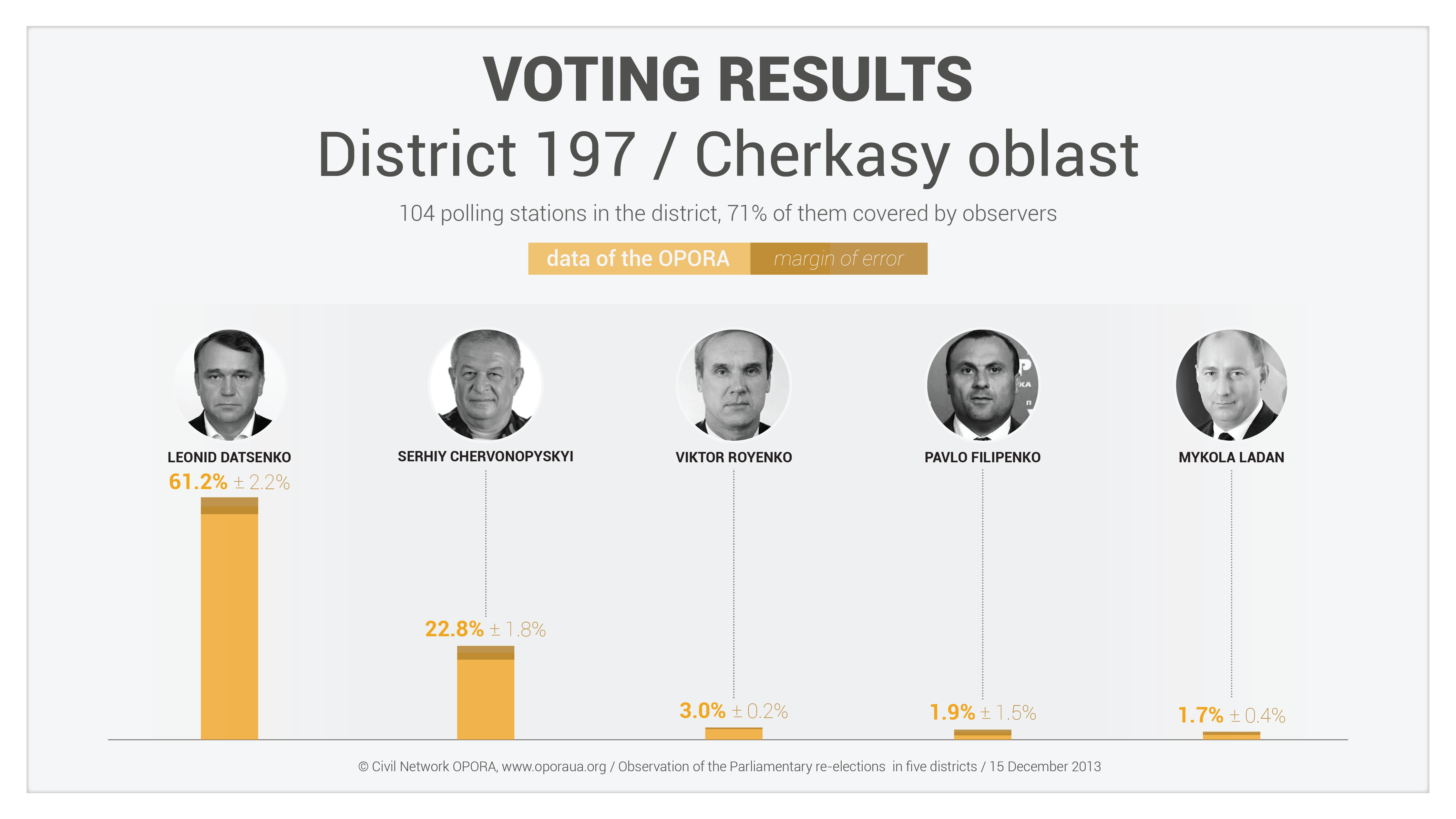
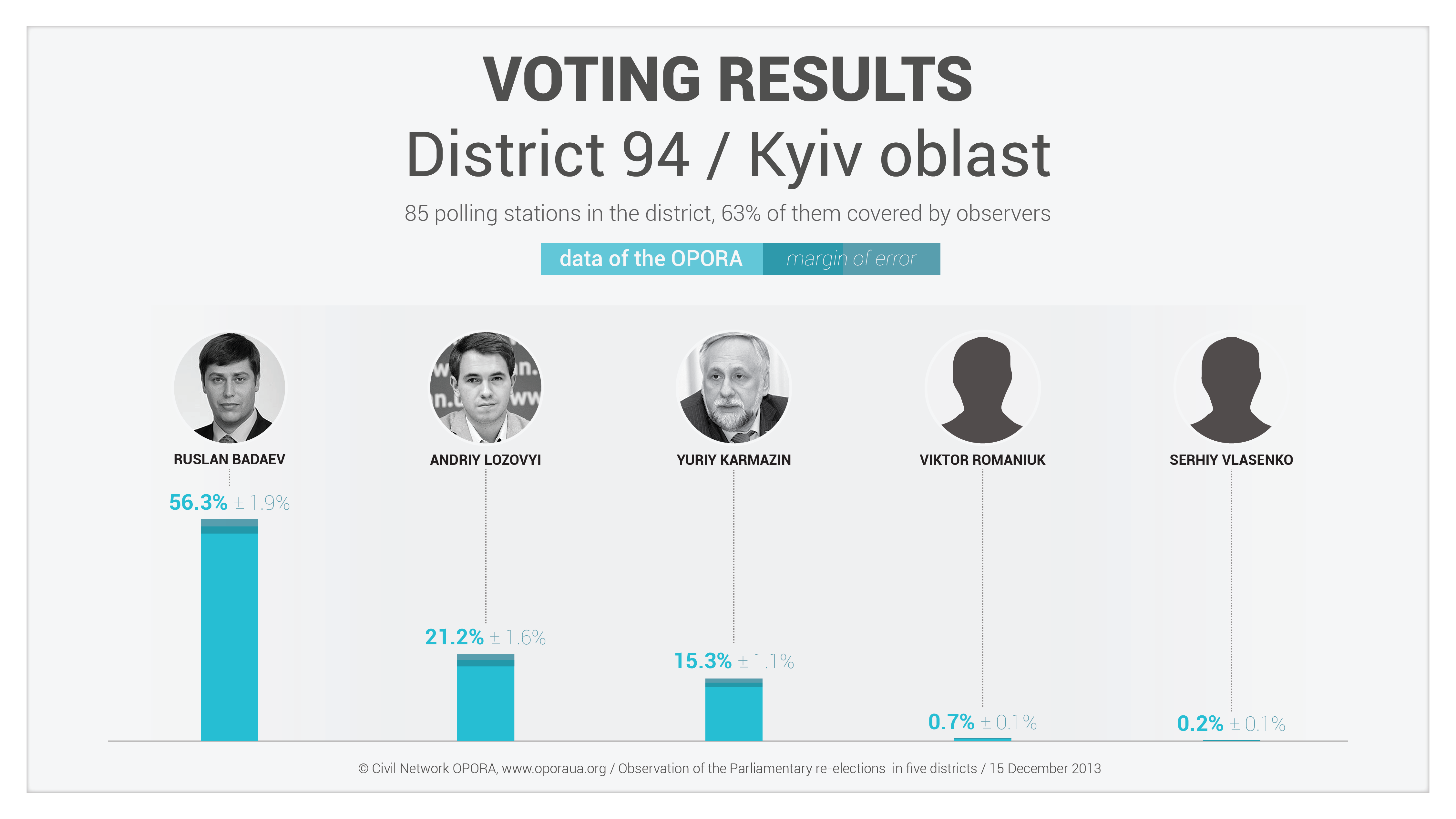
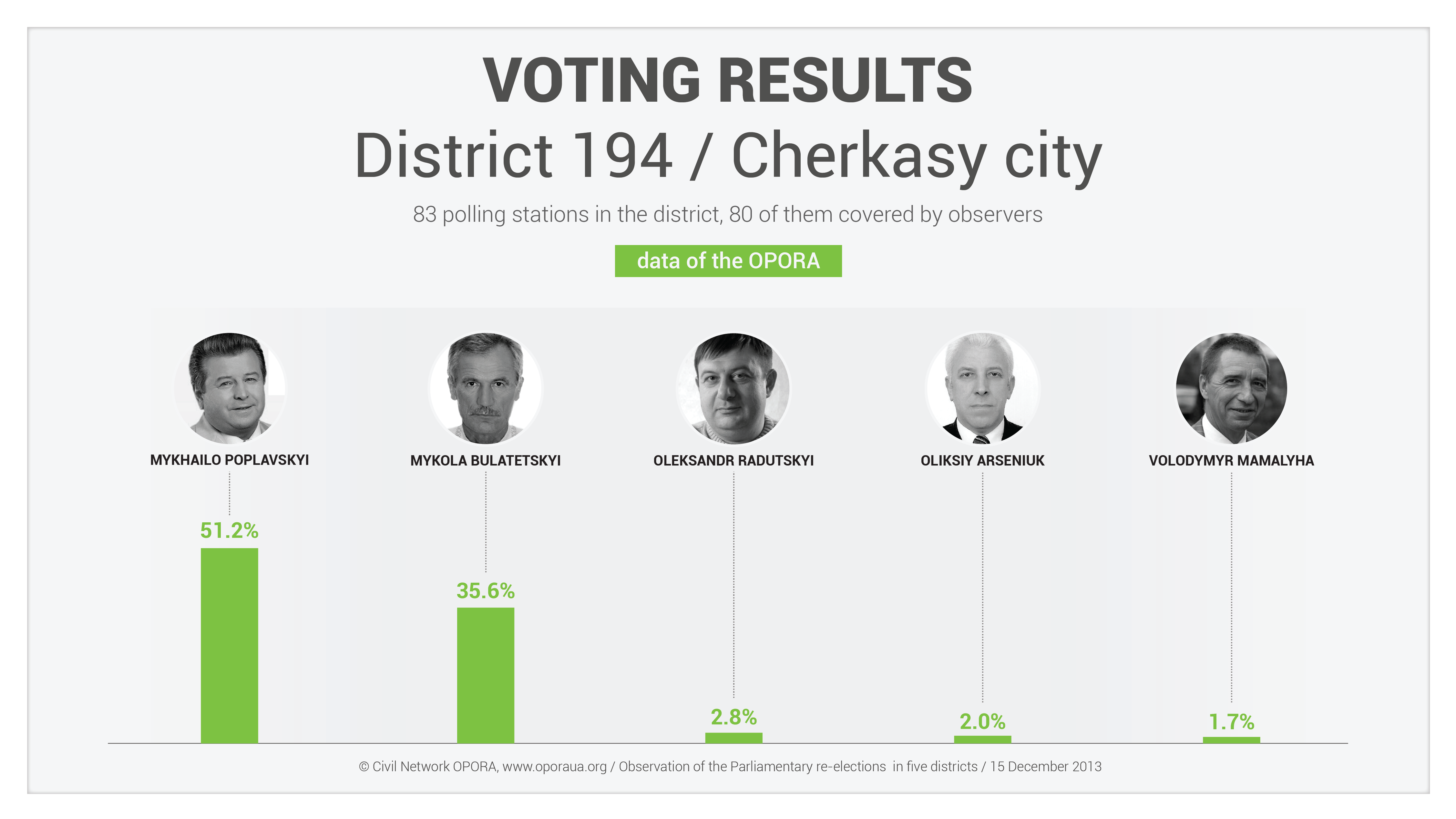
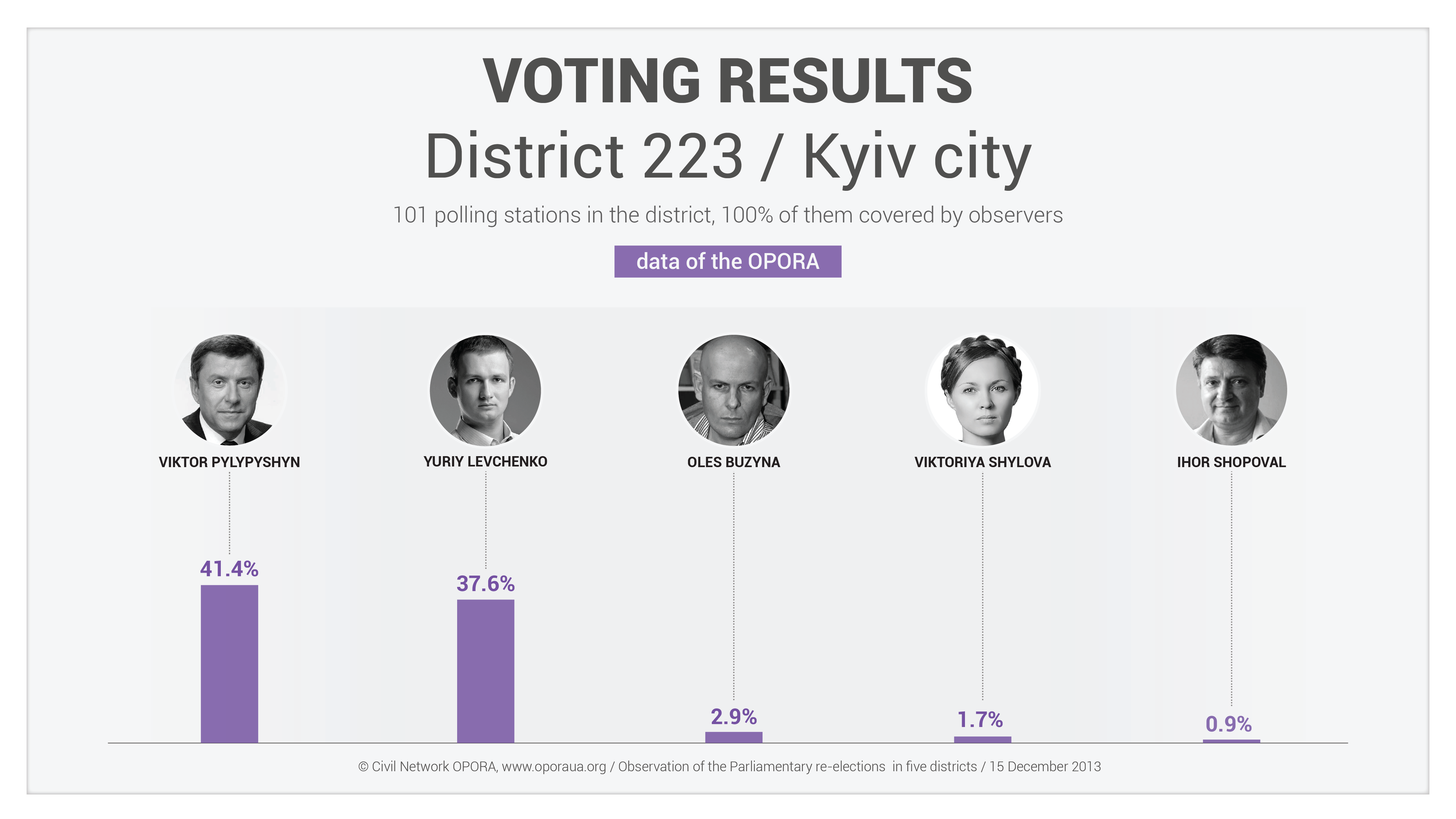
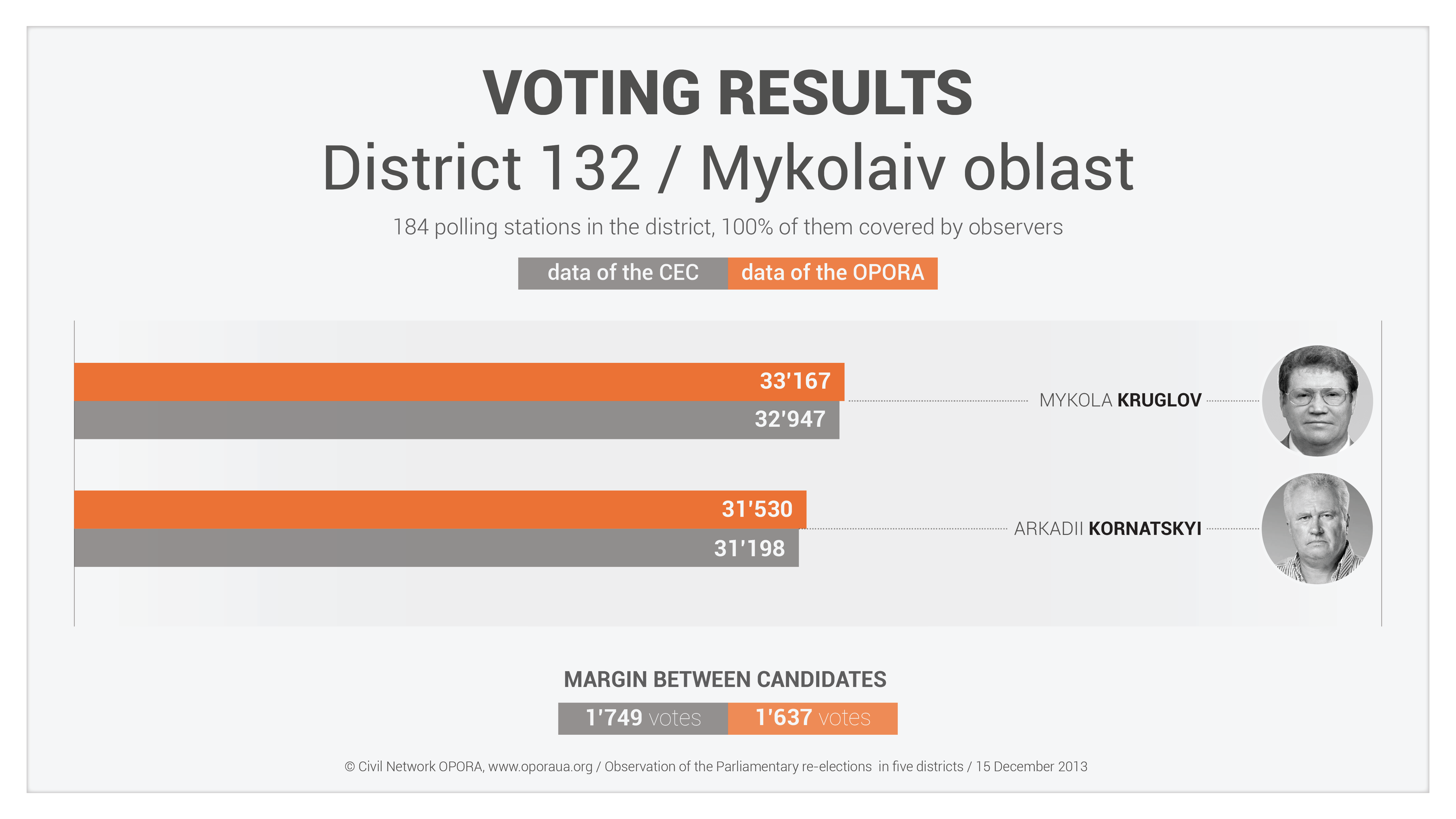
For comment, please contact: